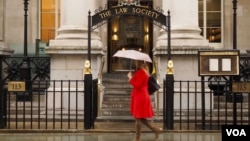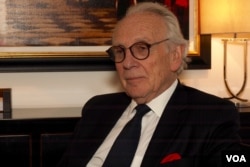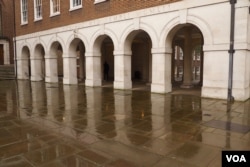Private intelligence companies are part of a booming business in London and the British government complains it is having trouble retaining talented agents who are being drawn by high salaries and more growth opportunities in a blossoming industry estimated to be worth $19 billion.
“Our mission is to fill a gap of knowledge or information in any situation,” said Patrick Grayson, founder and CEO of GPW, a respected mid-sized London intelligence firm. “There’s always something people should or could know in addition to what they do know. Our job is to answer that question. To fill that gap in knowledge.”
With legal firms as their key clients, Gray’s company has set up shop on London’s Chancery Lane in the heart of the city’s legal district, where solicitors and judges dressed in the traditional court garb that includes white wigs and black robes can be seen walking between the courts and their offices in the medieval Inner Temple area.
The business of private investigations was once regarded as less than respectable and downmarket – that of the stereotypical private eye in a trench coat under a streetlight; but industry observers note the private investigators of today have been pulled from the gutter and into the boardroom, where they take their places next to lawyers and accountants.
The man some in the industry credit as the inventor of the modern private corporate investigations sector is former prosecutor Jules Kroll, a New Yorker who in 1986 started Kroll investigations. The company’s revenues now top $1 billion.
It is at Kroll’s company that Grayson and other big names in the field learned the trade and brought it to London, where the city’s strategic geographic location between the United States and Asia and its long-established history as a center of espionage made it the right locale for the new industry.
Crowded playing field
Industry observers say the playing field has become crowded, mostly with small firms of as few as three people; but the sector continues to grow as big corporations expand operations overseas and seek to minimize risks in environments they do not fully understand.
“Large companies draw on us because they don’t have the investigative capacity internally and where that capacity has its work more recently is in the international context. Our firm understands cultural sensitivities,” says Nicholas Connon, director of Quintel Intelligence, a London firm.
Clients include companies taking new clients and investing in emerging markets of Africa, eastern Europe, and east Asia that are unfamiliar territory and where things are sometimes not what they appear.
“We’re actually getting lots of requests, with the basic question, ‘can you tell me what’s going on,’” said Alex Bomberg of International Intelligence, which works in faraway places like India. “Even if you look at the books of the company, it’s not necessarily going to give you the full picture.”
Among their services, companies like Bomberg’s provide pattern of life studies that give a picture of the people in a company that can be different from the image portrayed on its website, and insight on how a company is really doing. “A swan might look great above the water line, but how people are living their lifestyle within that company can be a different kind of fish,” Bomberg said.
Usually not James Bond stuff
The work of corporate intelligence agents is more often not the exciting stuff of James Bond movies. It can involve combing through individuals’ credit histories and analyzing personal habits – work that can include going through people’s trash. “We’re talking about what car they drive, what’s going into their dust bin, where their wives are shopping,” said Bomberg.
Although the modern industry had its start in New York, London is a breeding ground for firms, and one where they naturally thrive. The city has for centuries been a center of espionage and the British are credited with being in the spying business perhaps longer than anyone else.
One reason is the nation’s history as a great colonial power.
“Britain has been a very fertile place for information, intelligence gathering, and that has to do with our position in the globe, the British tradition of exploring foreign parts and relying on accurate information to expand its interests,” said Grayson.
Getting that accurate information requires tools that are reminiscent of the movies. Gear commonly used include jamming equipment to ensure that boardroom discussions are not being recorded and bug-searching devices.
$1,000 an hour
Intelligence company officials and operatives interviewed agreed there is no piece of equipment that beats the human eyeball, and the knowledge and experience to know what to look for.
Observers say the British government faces a brain drain as agents employed by police forces, the military and civilian intelligence agencies leave their jobs for better paying positions in private sector firms that often bill at rates of more than $1,000 an hour.
“If they’ve been working for a government agency for a long time, the draw is money. There’s not a lot of money working for the government. Even the pensions are not great these days. You could quite easily double that overnight,” Bomberg said.
It is not only former intelligence officers who seek out firms. Recruits include financial advisers with backgrounds that include things like experience in property or construction, lawyers, and sometimes academics.
When the companies recruit people, they essentially buy experience.
“We recruit among whoever is the best,” said Connon. “We draw our expertise across the board to get into the specific situation.”







